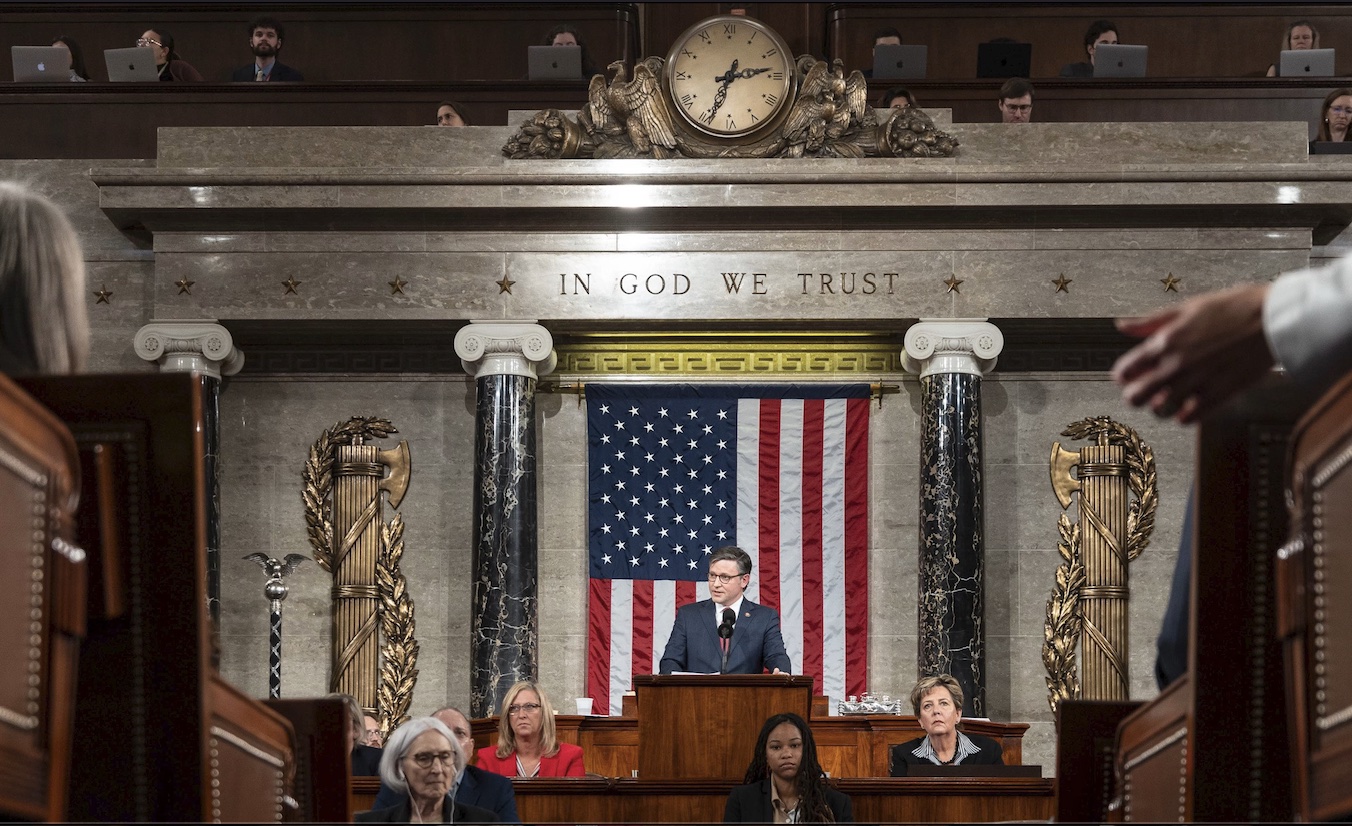Speaker Johnson’s First Test
The House is scheduled to vote this week on assistance to Israel—but not Ukraine. Can the new Speaker thread a tricky legislative needle?

Published by The Lawfare Institute
in Cooperation With

Last week, the House of Representatives selected Mike Johnson (R-La.) as its new speaker. This week, he’ll begin to navigate the legislative waters with a planned vote on a measure providing $14.3 billion in aid for Israel.
The Israel package is just one piece of a broader proposal from the Biden administration that clocks in at $106 billion and has four basic components: funding related to the ongoing war in Israel and the Gaza Strip, assistance for Ukraine, aid to Taiwan, and money to support security along the U.S.-Mexico border.
The administration’s request includes $14.3 billion for Israel, including funds to replace U.S. stocks that are being routed to Israel and to purchase additional capabilities for Israel’s Iron Dome system. It also includes, separately, $9.15 billion in humanitarian assistance for affected civilians in several areas, including both the Gaza Strip and Ukraine.
For Ukraine more generally, the administration has requested $61.4 billion. This comes after Congress did not act on an earlier proposal, sent by the White House in August, that would have provided $24 billion in additional support for the Ukranians. As a partial government shutdown neared at the end of September, the Senate advanced a measure funding federal operations and allocating a smaller amount—$6 billion—for Ukraine. But when the House approved, less than 24 hours before the deadline for action, a temporary funding bill without assistance to Ukraine, the Senate ultimately approved it as well. A reported promise from then-Speaker of the House Kevin McCarthy (R-Calif.) to act quickly to approve transfer authority that would have provided some flexibility without the approval of new funds was a victim of McCarthy’s ouster at the hand of a dissident faction within his own conference just three days after the short-term spending measure was approved.
Johnson, meanwhile, has indicated that the House will cleave off the Israel funding from the rest of the broader spending package and move it on its own. He’s also indicated that Republicans plan to seek offsets, or corresponding spending cuts elsewhere—in this case, from the Internal Revenue Service—for the Israel aid package. “Paying for” unexpected spending is demanded periodically by some legislators as a condition of their support; in 2012 and 2013, for example, a debate over whether to offset spending was a major obstacle to speedy passage of aid to northeastern states recovering from Superstorm Sandy. But it is highly unusual to demand that Congress make cuts elsewhere as part of approving assistance to a major ally, let alone one with the level of bipartisan support Israel generally enjoys in Washington. (What’s more, the specific offsetting change proposed here is a cut in name only, since spending less on tax enforcement ultimately leads to less government revenue coming in.)
What do these dynamics tell us about where Johnson finds himself as he assumes the speakership? First, while Johnson was able to build a coalition within the House GOP conference to get elected speaker, the fundamental, macro-political dynamics that plagued former Speaker Kevin McCarthy remain. House Republicans have a slim majority, and some of their members have threatened to oppose aid unless it is offset, which is likely why the initial House Republican proposal contains the IRS cuts. But at least two other GOP House members have announced that they will oppose any aid to Israel, leaving Johnson with little room for error within his own conference.
Turning to Democrats in large numbers—which McCarthy had to do to keep the government open at the end of September—is likely not an option for Johnson. Democrats prefer to keep the whole package together and strongly oppose the proposed cuts—both on principle, and because they would target increased funding for the IRS that was enacted as part of one of President Biden’s signature legislative achievements, the Inflation Reduction Act. Other Democrats are likely to point to the absence of any humanitarian assistance for Palestinian civilians in the Republicans’ bill as a reason to oppose it. Some Democrats may still ultimately support the GOP proposal; Rep. Jared Moskowitz (D-Fla.), for example, described the IRS cuts as an attempt by Republicans to bait Democrats into opposing aid for Israel, saying he was “not going to fall for [that] stupid trap.”
House Republicans’ efforts to split the funding for Israel off from the larger package also illustrate how support for additional assistance for Ukraine is declining within the conference. In July, during consideration of the National Defense Authorization Act, 89 Republicans voted to strip the measure of a provision authorizing $300 million in assistance to Ukraine. By late September, when the House voted on a standalone supplemental spending bill allocating the same amount for aid, 117 Republicans voted against it. While some of those members might be persuaded to vote for a measure that contains assistance to both Ukraine and Israel, opposition to aid to Ukraine in the House GOP conference appears to be growing. Including more support for Ukraine in a broader legislative package—whether that’s a supplemental like the one proposed by the White House, another continuing resolution, or a year-end appropriations deal—likely remains its best hope for passage.
Central to the prospects of additional aid for Ukraine is Senate Minority Leader Mitch McConnell (R-Ky.). McConnell has been one of the loudest voices advocating for more support for the Ukrainian defense efforts, and he has indicated that he shares Majority Leader Chuck Schumer’s (D-N.Y.) position that any supplemental spending bill should include funding to assist both Ukraine and Israel. But McConnell’s calls for his members to prioritize more aid to Ukraine have been meeting more resistance of late. In September, as the deadline to act in advance of a partial shutdown neared, McConnell successfully persuaded his conference to oppose a proposal from Sen. Ron Johnson (R-Wisc.) to fund the government for just two weeks on the grounds that it did not include additional money for Ukraine. But when it became clear that the House would pass a longer, 45-day temporary spending bill without Ukraine aid, the conference overruled McConnell, and he followed suit, instructing them to support the House’s plan. For a number of Senate Republicans, this choice was likely more about avoiding a shutdown than an outright rejection of additional assistance to Ukraine, but it still illustrates that McConnell may face more challenges in getting some of his colleagues to continue to prioritize the issue. In addition, some Republican senators are seeking additional concessions from Democrats—such as substantive changes to border policy, rather than just the additional funding for existing operations that the Biden administration has proposed—in exchange for their support for a supplemental spending bill.
Johnson, who is in just his fourth term in the House, is the most junior member to be elected speaker in more than 80 years. Whether his lack of legislative experience affects his ability to thread difficult needles in negotiating within his own conference, as well as with both the Senate and the White House, remains to be seen. This week’s efforts to provide support for two American allies will be a first test.





